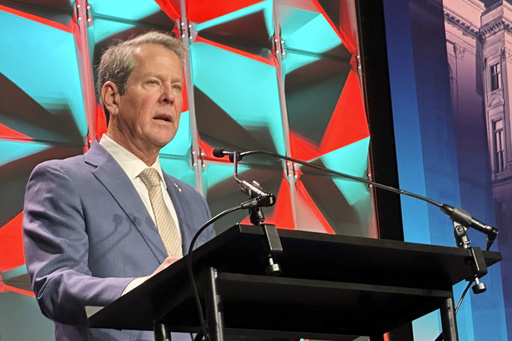
ATLANTA — A trio of Republican senators in Georgia has shifted their stance and supported Governor Brian Kemp’s key legislation aimed at limiting lawsuits, signaling that the governor continues to wield significant political influence during his second term.
This week, the proposed bills ascended to an important milestone by passing through a Senate committee, coinciding with Kemp’s efforts to engage with potential dissenters while coordinating a lobbying and advertisement push for the legislation.
Advocates of the measures, commonly referred to as tort reform, argue that they will assist businesses, healthcare professionals, property owners, and others in reducing expenses associated with baseless lawsuits and lowering insurance premiums. Conversely, critics point out the lack of evidence that insurance costs would drop and express concern that individuals may not receive deserved compensation for their grievances.
To advance the bills from the Senate Judiciary Committee, Kemp successfully navigated challenges posed by three key legislators known for their reluctance — Sen. Blake Tillery from Vidalia, Sen. Brian Strickland from McDonough, and Sen. Bo Hatchett from Cornelia — all of whom have backgrounds in trial law.
During the committee hearing, Tillery posed numerous questions, suggesting that losing parties in lawsuits should be responsible for covering court expenses.
“That’s a different issue for a different day,” replied John Kennedy, the Republican Senate president pro tem leading the bill for the governor. “Not here. It’s not what the governor wanted to propose in his tort reform package.”
Tillery persisted in his inquiries.
“This is the governor’s bill,” Kennedy reiterated.
One of the bills cleared the committee with a vote of 8-3 late Tuesday, with both Tillery and Hatchett lending their support. Strickland, in his role as committee chair, typically only votes to break ties. A second bill received backing from all Republican members and two Democrats, with one opposing it.
In 2023, Kemp promised the Georgia Chamber of Commerce, one of his principal allies, that he would work to limit lawsuits. However, after facing challenges in building consensus, he opted for a more careful approach involving further examination of the issue.
“This year has shifted the strategy on this matter to bring in voices beyond the Gold Dome,” noted Cody Hall, a political strategist for Kemp.
Both proponents and opponents of the legislation are investing heavily in lobbying efforts as Kemp has warned of a special session if his bills do not receive approval. During the introduction of his legislation, a large number of supporters, including healthcare professionals, business owners, and road workers clad in reflective attire, gathered at the state Capitol.
Jen Jordan, a Democrat who vacated her state Senate role to run unsuccessfully for attorney general in 2022, highlighted that the governor’s leadership committee significantly boosts his authority. This campaign finance mechanism enables Kemp to raise unlimited funds, even during legislative sessions, unlike traditional candidate committees, which face donation caps and restrictions on fundraising during sessions.
“Kemp possesses substantial power currently because he commands significant financial resources, and he is utilizing them effectively,” Jordan remarked.
As of January 31, Kemp’s Georgians First leadership committee reported having $3.25 million available, having raised $2.4 million over the previous six months.
The first bill establishes more stringent standards for liability regarding injuries on private properties and prevents attorneys from collecting fees multiple times for the same lawsuit. It ensures that individuals receive compensation reflective of their actual medical expenses while also separating trials involving liability from those determining damages, among other reforms. The second bill seeks to regulate investments from external parties in litigation and prohibits foreign adversaries and governments from financing such actions.

